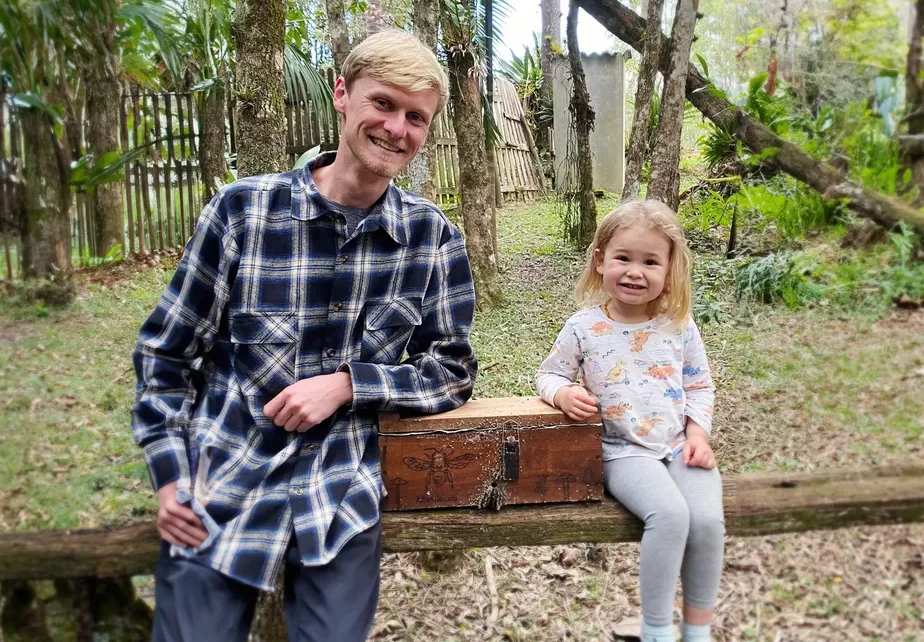Cooperator Jackson Baumann, stingless bee breeder in Santa Rosa de Lima (SC), accessed the resource through Pronaf Costing Sociobiodiversity
The first release of credit from the 2023/2024 Harvest Plan to finance meliponiculture, the activity of raising stingless bees, took place for a Cresol member. Through the Pronaf Custeio Sociobiodiversidade line, with resources from the National Bank for Economic and Social Development (BNDES), cooperative member Jackson Baumann, from Santa Rosa de Lima (SC), provided Brazil’s first financing for the activity in this new agricultural year .
Baumann’s family produces swarms, propolis and honey. “We are not selling swarms, just increasing our squad. In this next agricultural year, we want to make approximately 80 new swarms, which will make up our meliponaries. As we also work with honey from Apis melífero bees and we have an agribusiness with a Federal Inspection System (SIF), we want to work with bee products. In principle, we have a registered product from stingless bees, which is mandaçaia propolis, but we want to work with new products from stingless bees”, explains the member, served by Cresol Encostas da Serra Geral.
Baumann raises five species of stingless bees on his property, totaling approximately 115 swarms. The main focus is on the mandaçaia species, from which propolis is extracted. “My family has been working with the production of honey from stinging bees since 1995. We have been breeding stingless bees since 2000, however, it was just as a hobby. In the last five years, we have increased our swarm population, registered and started to formally commercialize stingless bee products.”
The family property is diversified, with agroecology, agritourism, beekeeping and meliponiculture. “The activity of stingless bees complements the others. As many people are unaware of the existence of these bees, we took guests at the inn on a tour with the experience of getting to know some of the bee species native to our Atlantic Forest and tasting honey directly from the hives”, highlights Jackson Baumann.
Resources for sustainability
The Federal Government established, in the 2023/2024 Harvest Plan, a new range in Pronaf Costing for socio-biodiversity, organic and agroecological products or those in agroecological transition, with interest of 3% per year. There was also a reduction in interest rates from 5% to 4% in Pronaf Agroecologia, Floresta e Bioeconomia in relation to the previous plan.
Among the socio-biodiversity products that fall within the rate of 3% per year are meliponiculture, pine nuts, blackberries, araticum, araçá, extractive açaí, babaçu, cream potatoes, extractive cocoa, cashew, Brazil nuts/nuts. do-brasil, copaíba, cupuaçu, yerba mate, guabiroba, guaraná, jabuticaba, ora-pro-nóbis, pitanga, among others. In addition, agroecological-based production systems or those in transition to agroecological-based systems and organic production systems are included.
Bees: future of generations
Beekeeping, more than being an economic activity that generates income, enables the continuity of life and survival of all beings. More than 80% of plants require pollination and bees, threatened with extinction, are species that also do this job. Therefore, the work of multiplying and preserving swarms is important.
About Cresol
With 28 years of history, more than 870 thousand members and 790 relationship agencies in 19 states, Cresol is one of the main cooperative financial institutions in the country. With a focus on personalized service, Cresol provides financial solutions for individuals, companies and enterprises rural.
/s2.glbimg.com/kIN69HtQ3Sp7aETdVkd7Al0BpO4%3D/600x0/filters%3Aquality%2870%29/i.s3.glbimg.com/v1/AUTH_59edd422c0c84a879bd37670ae4f538a/internal_photos/bs/2020/K/v/JDsprTQ1iYeatZObzD8A/logo-v2-cresol.png?w=640&ssl=1)



